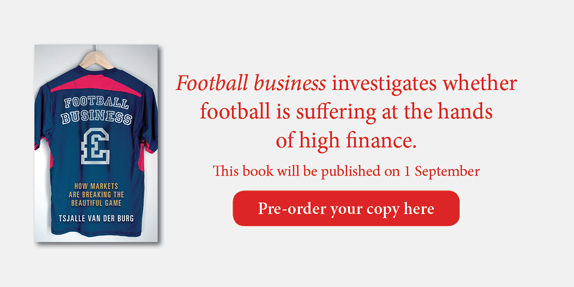Is football too expensive for the fans?
1 October 2014 by Rebecca in Business and finance, Football Business
We read with interest yesterday a story that Virgin Media has asked Ofcom to investigate the way premier league rights are sold. According to Virgin the auction process is driving up prices and causing ‘significant consumer harm’. In his book Football Business economist Tsjalle van der Burg probes this question and comes up with the radical solution that all football on TV should be free:
What would happen if the EU introduced a ban on pay TV for all live matches and highlights shown in EU countries, so that they became free again? A ban would naturally mean that broadcasters would make less money. Therefore, they would pay the clubs less for their broadcasting rights. So the clubs would earn less and would have to moderate their expenditure. They could easily do this by paying the players less so that, on balance, clubs would not be disadvantaged. In the days before pay TV, clubs basically broke even, with lower income and lower expenditure and George Best producing beautiful play. So a pay-TV ban is perfectly possible. Indeed, because there is surplus money in the sector – more money than is needed for it to function as it should – a pay-TV ban will not harm the game.
But how would TV stations finance the broadcasts? That’s simple: they would use the revenue from commercials. In the Netherlands, where many football matches are still available free of charge, the highlights of matches in the second professional league have been broadcast free-to-air for many years by a private company. The league is not extremely popular, with an average match attendance of about 4,000. This means that advertising can generate sufficient revenue for broadcasting all football matches which are at least as important as those of the second Dutch level. So we would be able to have a pay-TV ban for all these broadcasts while being sure they will remain on the air. Additionally, this also means there is no need for broadcasters to use taxpayers’ money to show football matches.
So it is possible to have a pay-TV ban for all important football matches. Indeed, there is only one drawback: players (and coaches) would earn less.
The benefits of a pay-TV ban would be considerable. The first advantage concerns the football fans who would watch the broadcasts anyway: they would get them for free. Their savings would be more or less equal to what the players (and coaches) would lose through reduced salaries. If the savings for those fans were the only advantage of the ban, the question of whether we should have a ban would be a question of fairness only.
But the ban also has another advantage. This concerns football fans who do not watch (certain) football matches on pay TV because the subscription fee is simply too high for them. These fans will watch the broadcasts if they are free, because football gives them pleasure. For these people, a pay-TV ban would mean more pleasure. At the same time, the broadcasters’ costs would not rise when more people turned on their television sets to watch football. So with a pay-TV ban we get more pleasure without any extra costs. This means that on balance the net effect is that the football community would be better off.

